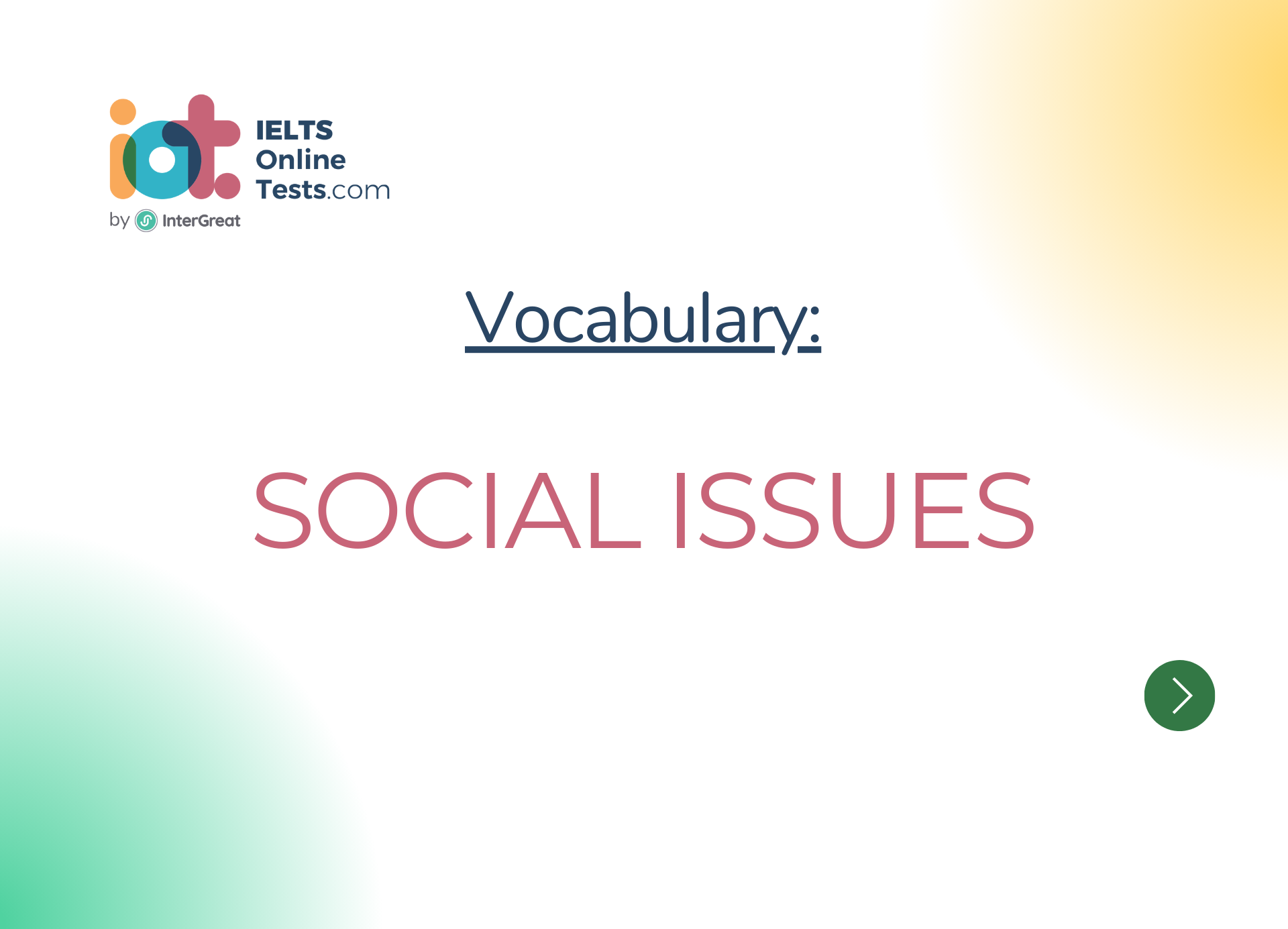
Social issues
Here are some vocabulary words related to social issues for IELTS band scores 4.5-6.0:
Poverty:
The state of being extremely poor, lacking access to basic needs like food, shelter, and healthcare.
Inequality:
The unfair distribution of resources, opportunities, or wealth among different groups in society.
Discrimination:
Unfair treatment or prejudice against individuals or groups based on their race, gender, religion, or other characteristics.
Unemployment:
The condition of being without a job and actively seeking employment.
Homelessness:
The state of lacking a permanent place to live, often resulting from poverty and housing issues.
Education Disparities:
Unequal access to quality education, often based on socioeconomic status or geographic location.
Hunger:
The physical discomfort and weakness caused by lack of food.
Healthcare Access:
The availability and affordability of medical services for all members of society.
Climate Change:
The long-term alteration of Earth's climate due to human activities, leading to environmental issues.
Environmental Pollution:
Contamination of air, water, or soil by harmful substances, negatively impacting ecosystems and human health.
Overpopulation:
A situation where the number of people exceeds the carrying capacity of a region.
Child Labor:
The employment of children in exploitative and hazardous conditions, depriving them of their childhood and education.
Gender Equality:
The principle of treating individuals of different genders with equal rights and opportunities.
Racism:
Discrimination or prejudice based on race or ethnic background.
Social Exclusion:
The marginalization of certain groups from full participation in society.
Violence:
Physical or emotional harm inflicted on individuals or groups, often resulting from social tensions.
Human Rights:
Fundamental rights and freedoms that every individual is entitled to, regardless of race, religion, or nationality.
Civil Rights:
The rights of citizens to political and social freedom and equality.
Migration:
The movement of people from one place to another, often for better living conditions or job opportunities.
Refugees:
People who have been forced to leave their home countries due to persecution, conflict, or violence.
Social Welfare:
Government programs and policies designed to provide support and assistance to vulnerable populations.
Public Health:
The health of the population as a whole, with a focus on disease prevention and health promotion.
Drug Abuse:
The excessive and harmful use of drugs or substances.
Corruption:
Dishonest or fraudulent conduct by those in power, often for personal gain.
Cyberbullying:
Harassment or intimidation using electronic communication, such as social media or online platforms.
Privacy:
The right to keep personal information and data confidential and secure.
Freedom of Speech:
The right to express opinions and ideas without censorship or restraint.
Social Media Impact:
The influence of social media on society, including its positive and negative effects.
Community Engagement:
Active participation and involvement of community members in decision-making processes.
Globalization:
The process of increased interconnectedness and interdependence among countries and cultures.
Substance Abuse:
The misuse or overuse of drugs, alcohol, or other addictive substances.
Gender Pay Gap:
The difference in earnings between men and women in the workforce.
Bullying:
Repeated aggressive behavior intended to hurt, intimidate, or humiliate others.
Mental Health:
The emotional and psychological well-being of individuals, including issues like anxiety and depression.
Elderly Care:
Support and services provided to older adults, especially those who are no longer able to care for themselves.
Disability Rights:
The advocacy for equal opportunities and rights for people with disabilities.
Domestic Violence:
Physical, emotional, or psychological abuse within a household, often involving intimate partners.
Income Inequality:
The disparity in earnings and wealth between the rich and the poor.
Social Justice:
The pursuit of fairness, equality, and rights for all members of society.
Child Marriage:
The practice of marrying children, particularly young girls, before the age of 18.
Youth Empowerment:
Initiatives and programs aimed at supporting and encouraging the active participation of young people in society.
Censorship:
The suppression or control of information, media, or artistic expression deemed offensive or harmful by authorities.
Human Trafficking:
The illegal trade of people, typically for forced labor or sexual exploitation.
Environmental Conservation:
Efforts to protect and preserve natural resources and ecosystems for future generations.
Education Funding:
Allocation of financial resources to support educational institutions and programs.
Food Security:
Access to a sufficient and reliable supply of nutritious food for all individuals.
Social Integration:
The inclusion and acceptance of individuals from diverse backgrounds into mainstream society.
Community Development:
Initiatives aimed at improving the economic, social, and cultural well-being of local communities.
Youth Unemployment:
The lack of job opportunities for young people entering the workforce.
Social Services:
Government or non-profit organizations that provide assistance and support to vulnerable populations.
Remember to use these vocabulary words in sentences and essays to improve your language skills and be well-prepared for the IELTS exam. Understanding and discussing social issues can help you develop critical thinking and analytical abilities, which are valuable skills for the IELTS Writing and Speaking sections. Best of luck with your studies!




